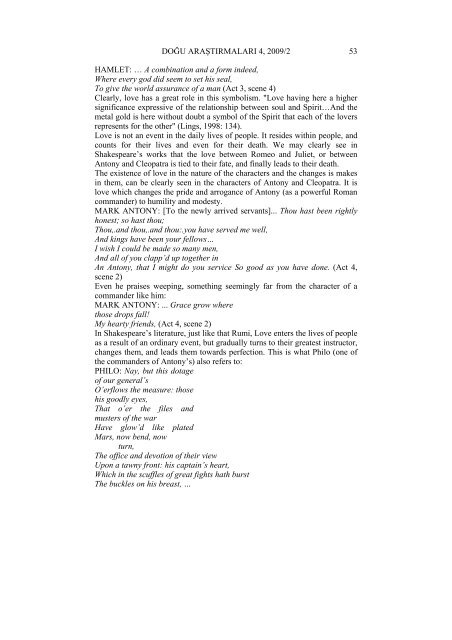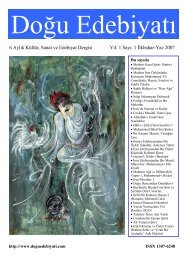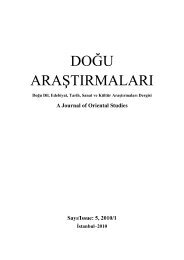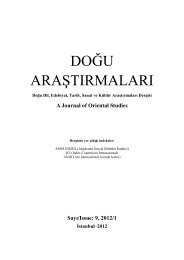A Journal of Oriental Studies Sayı/Issue - Doğu Edebiyatı
A Journal of Oriental Studies Sayı/Issue - Doğu Edebiyatı
A Journal of Oriental Studies Sayı/Issue - Doğu Edebiyatı
You also want an ePaper? Increase the reach of your titles
YUMPU automatically turns print PDFs into web optimized ePapers that Google loves.
DOĞU ARAŞTIRMALARI 4, 2009/2 53<br />
HAMLET: … A combination and a form indeed,<br />
Where every god did seem to set his seal,<br />
To give the world assurance <strong>of</strong> a man (Act 3, scene 4)<br />
Clearly, love has a great role in this symbolism. "Love having here a higher<br />
significance expressive <strong>of</strong> the relationship between soul and Spirit…And the<br />
metal gold is here without doubt a symbol <strong>of</strong> the Spirit that each <strong>of</strong> the lovers<br />
represents for the other" (Lings, 1998: 134).<br />
Love is not an event in the daily lives <strong>of</strong> people. It resides within people, and<br />
counts for their lives and even for their death. We may clearly see in<br />
Shakespeare’s works that the love between Romeo and Juliet, or between<br />
Antony and Cleopatra is tied to their fate, and finally leads to their death.<br />
The existence <strong>of</strong> love in the nature <strong>of</strong> the characters and the changes is makes<br />
in them, can be clearly seen in the characters <strong>of</strong> Antony and Cleopatra. It is<br />
love which changes the pride and arrogance <strong>of</strong> Antony (as a powerful Roman<br />
commander) to humility and modesty.<br />
MARK ANTONY: [To the newly arrived servants]... Thou hast been rightly<br />
honest; so hast thou;<br />
Thou,.and thou,.and thou:.you have served me well,<br />
And kings have been your fellows…<br />
I wish I could be made so many men,<br />
And all <strong>of</strong> you clapp’d up together in<br />
An Antony, that I might do you service So good as you have done. (Act 4,<br />
scene 2)<br />
Even he praises weeping, something seemingly far from the character <strong>of</strong> a<br />
commander like him:<br />
MARK ANTONY: ... Grace grow where<br />
those drops fall!<br />
My hearty friends, (Act 4, scene 2)<br />
In Shakespeare’s literature, just like that Rumi, Love enters the lives <strong>of</strong> people<br />
as a result <strong>of</strong> an ordinary event, but gradually turns to their greatest instructor,<br />
changes them, and leads them towards perfection. This is what Philo (one <strong>of</strong><br />
the commanders <strong>of</strong> Antony’s) also refers to:<br />
PHILO: Nay, but this dotage<br />
<strong>of</strong> our general’s<br />
O’erflows the measure: those<br />
his goodly eyes,<br />
That o’er the files and<br />
musters <strong>of</strong> the war<br />
Have glow’d like plated<br />
Mars, now bend, now<br />
turn,<br />
The <strong>of</strong>fice and devotion <strong>of</strong> their view<br />
Upon a tawny front: his captain’s heart,<br />
Which in the scuffles <strong>of</strong> great fights hath burst<br />
The buckles on his breast, …





